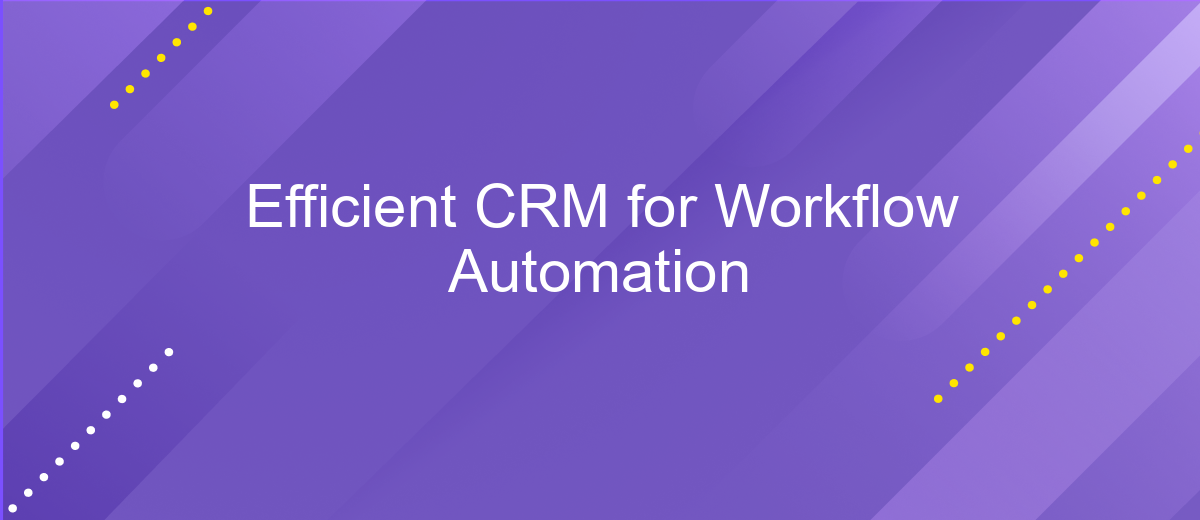Efficient CRM for Workflow Automation
In today's fast-paced business environment, efficient Customer Relationship Management (CRM) systems are crucial for streamlining workflows and enhancing productivity. By automating routine tasks and centralizing customer data, a robust CRM can transform how businesses operate, enabling teams to focus on strategic initiatives and improve customer satisfaction. This article explores the key features and benefits of implementing an efficient CRM for workflow automation.
Introduction to Efficient CRM for Workflow Automation
Efficient CRM systems are critical for streamlining workflow automation in today's fast-paced business environment. By integrating various functions such as sales, customer service, and marketing, these systems ensure that all processes are synchronized and efficient. This integration not only saves time but also enhances productivity and customer satisfaction.
- Automated task management
- Seamless integration with other tools
- Real-time data analysis
- Improved customer interactions
For businesses looking to optimize their CRM systems, tools like ApiX-Drive offer valuable solutions. ApiX-Drive facilitates the integration of different applications and services, allowing for smoother data flow and process automation. By leveraging such tools, companies can significantly enhance their operational efficiency and focus on strategic growth.
Benefits of Automating Workflows with CRM

Automating workflows with a CRM system offers numerous benefits, significantly enhancing efficiency and productivity. By automating repetitive tasks, businesses can free up valuable time for employees, allowing them to focus on more strategic activities. This leads to faster task completion and reduces the likelihood of human errors, ensuring a more reliable and consistent output. Additionally, automated workflows facilitate better tracking and management of customer interactions, providing a comprehensive overview of client relationships and helping to identify potential areas for improvement.
Another key advantage is the seamless integration capabilities that modern CRMs offer. Tools like ApiX-Drive enable businesses to effortlessly connect their CRM with various applications, ensuring smooth data flow and eliminating the need for manual data entry. This not only saves time but also enhances data accuracy and consistency across platforms. By leveraging these integrations, companies can create a unified and efficient ecosystem that supports better decision-making and drives overall business growth.
Essential Features of an Efficient CRM for Workflow Automation

An efficient CRM for workflow automation must possess several key features to streamline processes and enhance productivity. These features ensure that businesses can manage customer relationships seamlessly while automating repetitive tasks.
- Integration Capabilities: The CRM should easily integrate with other tools and platforms. Services like ApiX-Drive can facilitate this by enabling smooth data transfer between different applications.
- Automation of Routine Tasks: Automating repetitive tasks such as email follow-ups, data entry, and scheduling can save time and reduce errors.
- Customizable Workflows: The ability to create and modify workflows according to specific business needs is crucial for efficiency.
- Real-time Analytics and Reporting: Access to real-time data and customizable reports helps in making informed decisions quickly.
- User-friendly Interface: An intuitive and easy-to-navigate interface ensures that all team members can use the CRM effectively without extensive training.
Implementing these essential features in a CRM system will not only improve workflow automation but also enhance overall business performance. By leveraging tools like ApiX-Drive for integration, businesses can ensure a seamless and efficient operational environment.
Implementation and Deployment Considerations

Implementing an efficient CRM for workflow automation requires careful planning and consideration of various factors. The first step is to identify the specific needs of your organization and how the CRM system can address these needs. This involves analyzing existing workflows, identifying bottlenecks, and determining the key features that the CRM should have.
Deployment of the CRM system should be carried out in phases to ensure smooth integration with existing systems and minimize disruptions. It is essential to involve all stakeholders in the planning process to ensure that the system meets their requirements and that they are adequately trained to use it effectively.
- Ensure compatibility with existing software and hardware infrastructure.
- Utilize integration services like ApiX-Drive to streamline data transfer between different platforms.
- Conduct thorough testing before full-scale deployment.
- Provide comprehensive training and support for all users.
Regular monitoring and evaluation of the CRM system are crucial to ensure it continues to meet the evolving needs of the organization. Feedback from users should be actively sought and used to make necessary adjustments and improvements. This proactive approach will help in maximizing the benefits of the CRM system and achieving optimal workflow automation.
Conclusion
Efficient CRM systems for workflow automation have become indispensable tools for modern businesses. By streamlining operations, reducing manual tasks, and enhancing customer interactions, these systems not only improve productivity but also contribute to higher customer satisfaction. The integration of advanced features such as AI-driven analytics, automated communication, and real-time data tracking ensures that organizations can stay ahead in a competitive market.
Moreover, the ability to seamlessly integrate with other platforms and services, such as ApiX-Drive, further amplifies the efficiency of CRM systems. ApiX-Drive enables businesses to automate data transfers between various applications without the need for complex coding, making it easier to maintain synchronized and up-to-date information across all tools. This holistic approach to workflow automation fosters a more cohesive and responsive business environment, ultimately driving growth and success.
FAQ
What is workflow automation in CRM?
How can CRM workflow automation benefit my business?
What types of tasks can be automated in a CRM system?
How do I integrate my CRM with other tools for better workflow automation?
Is it difficult to set up CRM workflow automation?
Apix-Drive is a simple and efficient system connector that will help you automate routine tasks and optimize business processes. You can save time and money, direct these resources to more important purposes. Test ApiX-Drive and make sure that this tool will relieve your employees and after 5 minutes of settings your business will start working faster.

